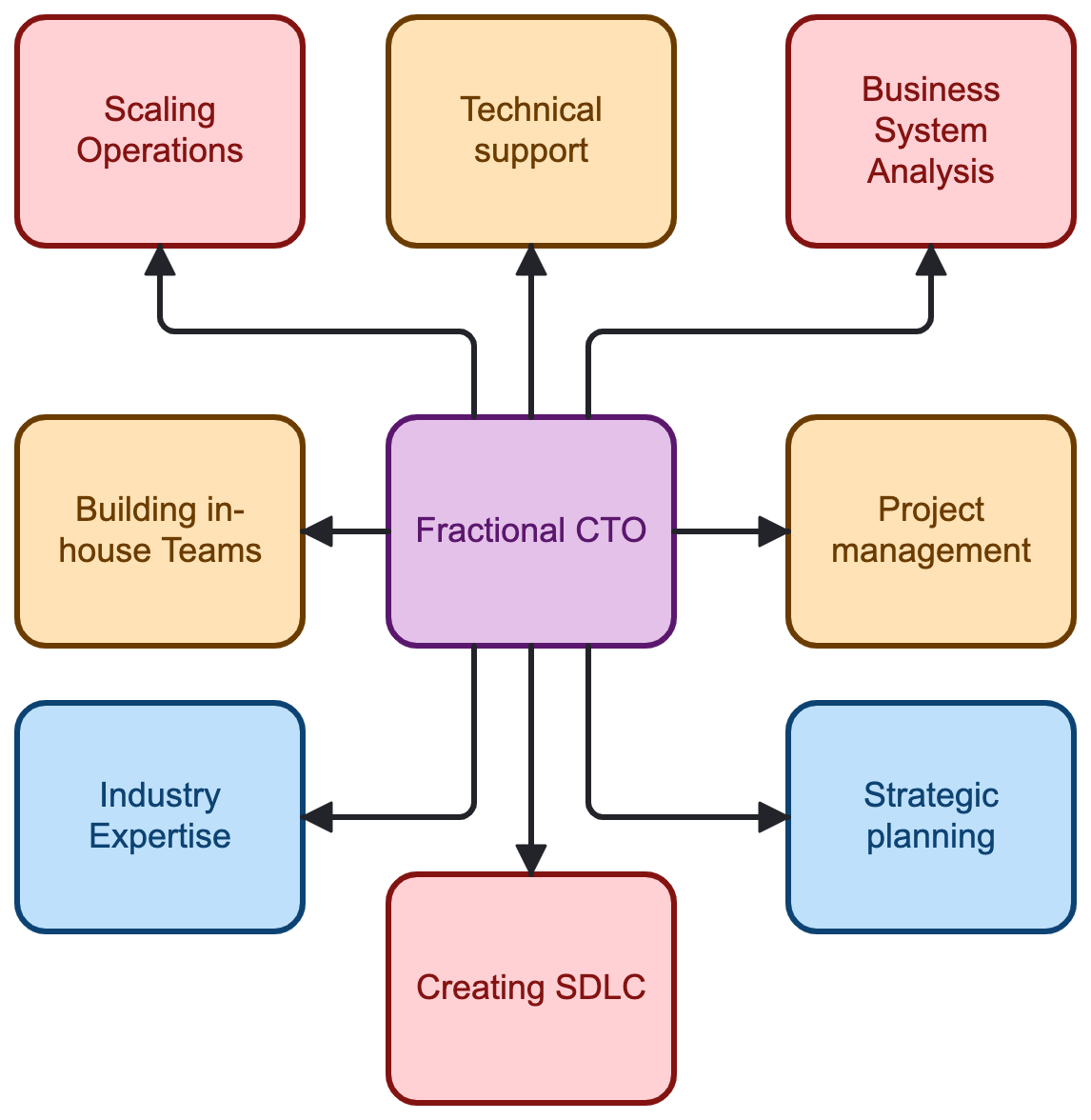A Fractional Chief Technology Officer (CTO) is a senior technology executive who provides part-time or temporary CTO services to a company. Instead of hiring a full-time CTO, businesses, particularly startups and small to medium-sized enterprises, may opt for a fractional CTO to access high-level technology expertise without the commitment of a full-time executive.
The key characteristics and responsibilities of a fractional CTO typically include:
- Part-Time Engagement: Fractional CTOs are usually not employed full-time by a single company. They work on a part-time basis, often providing a specified number of hours per week or month.
- Strategic Technology Leadership: They provide strategic guidance and leadership on technology-related matters. This can include technology roadmaps, product development strategies, and IT infrastructure decisions.
- Technical Expertise: Fractional CTOs are typically highly experienced technology professionals with a strong understanding of various technologies, trends, and industry best practices.
- Team Leadership: They may oversee and lead technology teams or work alongside existing technical teams to drive projects forward.
- Project Management: Fractional CTOs often play a key role in project management, ensuring that technology projects are completed on time and within budget.
- Vendor and Resource Management: They may be responsible for selecting and managing external technology vendors, consultants, and other resources to support the company's technology initiatives.
- Budgeting and Cost Control: They help in creating and managing technology budgets and ensuring that technology investments align with the company's financial goals.
- Technology Assessment: Fractional CTOs often conduct technology assessments to identify areas for improvement, cost-saving opportunities, and potential risks.
- Innovation: They drive innovation within the organization by staying up-to-date with the latest technologies and trends and evaluating how they can be applied to the company's goals.
- Cybersecurity and Compliance: They may be responsible for ensuring the company's technology infrastructure is secure and compliant with relevant regulations.
- Communication: They act as a bridge between the technical and non-technical teams, communicating complex technical concepts in a way that non-technical stakeholders can understand.
- Transitioning: Fractional CTOs can also help companies transition to a permanent, full-time CTO if and when the organization grows to a point where a full-time executive is necessary.
The advantages of hiring a fractional CTO include cost savings, flexibility, and access to a high level of expertise without the long-term commitment and expenses associated with a full-time CTO. It allows businesses to tap into technology leadership on an as-needed basis and adapt to changing technology requirements as the company grows and evolves.

When to Use a Fractional CTO
A Fractional Chief Technology Officer (CTO) is typically employed by companies in specific situations where they need access to high-level technology expertise, strategic guidance, and leadership without the commitment of hiring a full-time CTO. Here are common scenarios when a company may consider using a fractional CTO:
- Startups: Startups often have limited resources and may not be ready to commit to a full-time CTO. Fractional CTOs can help startups establish their technology strategies, build minimum viable products (MVPs), and provide technical leadership during the initial phases.
- Small to Medium-Sized Enterprises (SMEs): SMEs may not have the budget or workload to justify a full-time CTO. A fractional CTO can provide part-time strategic oversight, guide technology decisions, and help with specific projects or transitions.
- Interim Leadership: When a company is between CTOs, transitioning to a new CTO, or temporarily without a technology leader, a fractional CTO can fill the gap and maintain continuity in technology initiatives.
- Specific Projects: Companies that have a one-time, technology-intensive project, such as a software development project or system upgrade, can benefit from the expertise of a fractional CTO to ensure project success.
- Cost Control: Fractional CTOs can help companies control costs by providing strategic guidance and technical expertise on a part-time basis, reducing the expenses associated with a full-time executive.
- Access to Expertise: When a company lacks in-house technology expertise, a fractional CTO can provide access to a highly experienced technology professional to make informed decisions, set technology strategies, and ensure alignment with business goals.
- Technology Assessment and Improvement: Companies seeking to assess their current technology infrastructure, identify areas for improvement, and optimize technology investments can benefit from a fractional CTO's expertise.
- Innovation and Growth: Fractional CTOs can drive innovation within an organization by staying up-to-date with emerging technologies and trends and finding ways to apply them to the company's goals, promoting growth and competitiveness.
- Cybersecurity and Compliance: Companies looking to enhance their cybersecurity measures, ensure compliance with regulations, and protect their technology infrastructure may engage a fractional CTO to bolster their security efforts.
- Customized Solutions: Fractional CTOs can provide tailored solutions and advice to address a company's specific needs, whether related to software development, IT infrastructure, or other technology-related challenges.
It's important for companies to evaluate their specific circumstances, budget, and goals when considering whether to hire a fractional CTO. The choice to engage a fractional CTO should align with the company's strategic priorities and the need for specialized technology leadership and guidance without the long-term commitment of a full-time executive.